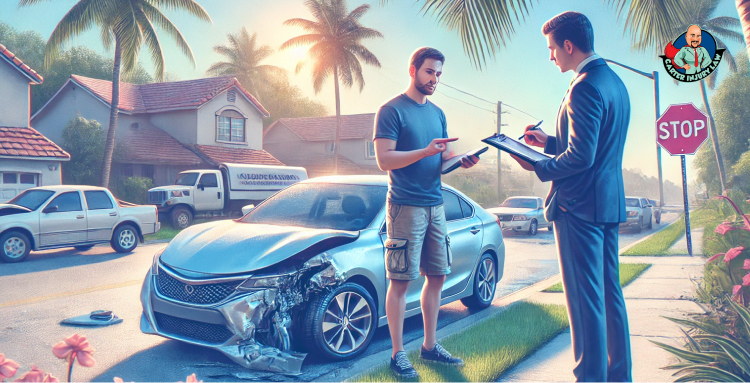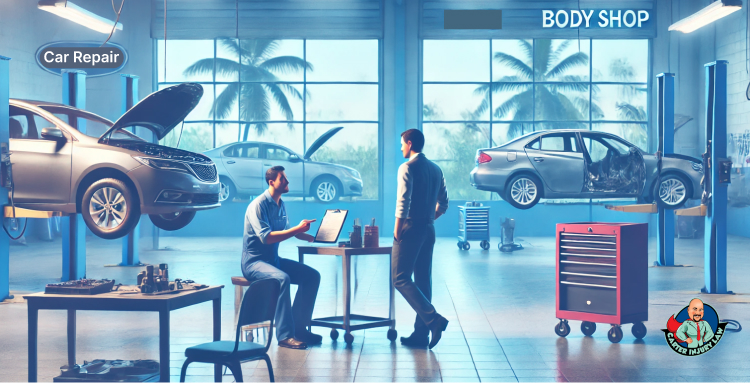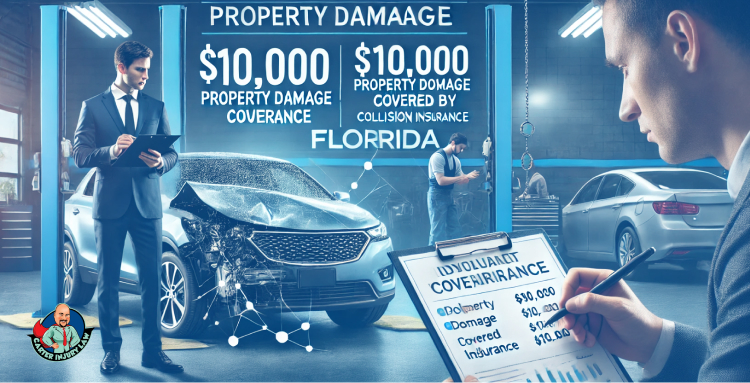
blog
December 21, 2024
Who Covers Your Car Repairs After an Accident in Florida?

Who’s responsible for fixing your car after an accident in Florida? That’s a question we hear all the time, and it makes sense. After all, if you’ve been in an accident, your car’s damaged, and naturally, you want to know how to get it fixed—and you’re entitled to that.
When it comes to repairs, you’ve got two main options to consider. You could go through your own insurance, or you could file with the at-fault driver’s insurance. Each choice has its own pros and cons, and we’re here to walk you through them. By the end, you’ll know which option might be best for your situation, so you can get back on the road with peace of mind.
Option 1: Filing a Claim Through Your Own Insurance Company
When it comes to getting your car repaired after an accident, the simplest and fastest route is often through your own insurance—if you have collision coverage.
What You Need to Know About Collision Coverage
Collision coverage is what allows you to file a claim for your car’s damages, no matter who’s at fault in the accident. It’s direct, it’s efficient, and it saves you from the extra wait time that often comes with using the other driver’s insurance.
How Deductibles Work When Filing Through Your Own Insurance
If you decide to go this route, be aware that a deductible will apply. A deductible is the portion you pay out of pocket before the insurance coverage kicks in. Deductibles vary by policy, commonly falling between $250, $500, or even up to $2,000. The choice of deductible impacts your payout as well as your premiums.
For instance, if your car is valued at $30,000 and your deductible is $1,000, the insurance company covers $29,000, with you paying the remaining $1,000. This setup keeps you covered but also shares a bit of the cost to control premiums.
The Advantages of Using Your Own Insurance for Repairs
Since you’re filing with your own insurance company, they don’t need to investigate who was at fault before they move forward with repairs or a payout. That’s what makes this option quicker; there’s no need to wait for the other driver’s insurance to respond, verify details, or complete their liability assessment. Your insurance company can get the ball rolling immediately.
Another advantage is that collision coverage protects you regardless of who’s responsible for the accident. It’s there to take care of your car’s damage, so you don’t have to worry about getting tied up in fault disputes to get back on the road.
Option 2: Filing a Claim Through the At-Fault Driver’s Insurance

If the other driver was at fault for the accident, you have the option to go through their insurance to cover your repairs. This approach has its advantages, but it also comes with some added waiting time and a bit of patience.
Why Filing Through the Other Driver’s Insurance Can Save You Money
One big perk here is that, unlike filing through your own insurance, you won’t have to pay a deductible. The at-fault driver’s insurance covers the repair costs, so your out-of-pocket expense is zero, assuming everything is confirmed and processed by their insurance company. This can be helpful if you’d rather avoid dipping into savings just to get your car fixed.
Rental Car Coverage: What to Expect When Repairs Are Underway
Another benefit is that if you go through the other driver’s insurance and they have adequate coverage, they should also cover a rental car for you while yours is being repaired. This rental coverage doesn’t come with any extra charge to you and can be a huge relief, especially if you rely on your car for daily commutes, errands, or family needs. Keep in mind, though, that this depends on their policy limits and their insurance company’s guidelines on rental car length.
Potential Drawbacks of Relying on the Other Driver’s Insurance
While going through the other person’s insurance means no deductible and the potential for a rental car, it’s not always the fastest way to get repairs underway. Their insurance company will need to investigate the accident, which can take time.
They’ll likely want to confirm who was at fault and may require additional information, like statements from their driver or a copy of the police report. If everything’s straightforward and there’s a police report showing clear fault, the process might speed up, but without that, delays are common.
Working with the other driver’s insurance company on your own can sometimes feel like a bit of a minefield. Without an attorney by your side, their insurance company may ask you detailed questions about the accident, your injuries, or other aspects of the incident that you’re better off not discussing.
These conversations can be tricky since most of the insurance company’s goal is to minimize their payout. When we handle cases, we make it clear that our clients aren’t to discuss their injuries, medical treatments, or how the accident happened beyond the car repair details. This protects you from giving statements that could complicate or even weaken your claim.
(I) Your Right to Choose a Body Shop and What to Consider

One thing many people don’t realize after an accident is that they have a choice in where their car gets repaired. Whether you’re filing through your own insurance or the other driver’s, you’re entitled to pick the body shop that you trust most to do the work. This decision can make a big difference in how comfortable you feel about the repair process and, ultimately, the quality of the results.
Choosing a body shop that you know, like, and trust can bring a sense of peace within. If you’ve got a favorite shop where you feel confident about the workmanship, going that route can be reassuring. You’re the one who will drive the car once repairs are complete, so having control over the repair quality matters.
But keep in mind that when you choose your own shop, you’ll need to work within the time limits that insurance companies usually place on rental car coverage. If your chosen shop takes longer than anticipated, the insurance company might not cover those extra rental days.
(II) Should You Use the Insurance Company’s Preferred Shop?
If you go with a shop of your choice, you’re in control of who does the repairs, which often translates to higher trust in the quality. This option is perfect if you already have a go-to shop or just want to ensure your car is fixed by a team you’re comfortable with.
On the other hand, if you’re okay with using a body shop that the insurance company recommends, there can be a few extra perks. Insurance companies often have partnerships with certain shops, and if the shop takes longer than expected, they might cover extra rental days without hesitation.
Essentially, if the insurance company’s chosen shop runs behind, they’ll be more likely to extend your rental period to match. Just remember that while you may get a bit of flexibility on rental time, this isn’t the shop you chose, so make sure you feel comfortable with the arrangement before moving forward.
(III) Understanding Florida’s Property Damage Minimum and Its Limits

In Florida, the minimum requirement for property damage coverage is $10,000. For minor fender-benders, that might be enough, but consider what happens if you’re driving a high-value vehicle or the damage costs run higher.
Even with their insurance paying up to the limit, you could still be left holding the bag for repairs that go beyond that $10,000. In cases like this, your collision coverage bridges the gap, giving you a space of comfort that your costs are covered regardless of the other driver’s insurance limitations.
For example, you’re hit by someone whose insurance maxes out at $10,000 for property damage. If your repair estimate comes in at $25,000, their insurance company will pay up to $10,000, and the rest – $15,000 – would typically be your responsibility. With collision coverage though, you’re safeguarded.
Instead of bearing the full brunt of those extra repair costs, your collision insurance covers the balance (minus your deductible), ensuring you’re not left in financial hardship due to someone else’s lack of coverage.
Need Help with Your Claim? Contact Carter Injury Law Today
If you’re dealing with property damage after a car accident in Florida or just have questions about how the insurance companies are handling your claim, don’t hesitate to reach out. You can call us anytime for a free, confidential case evaluation. It’s completely risk-free—there are no fees unless we win your case. We’re here to walk you through all your options, answer your questions, and make sure you get the guidance you need. Contact us today, and let’s work on getting the compensation that’s rightfully yours.
Recent posts























